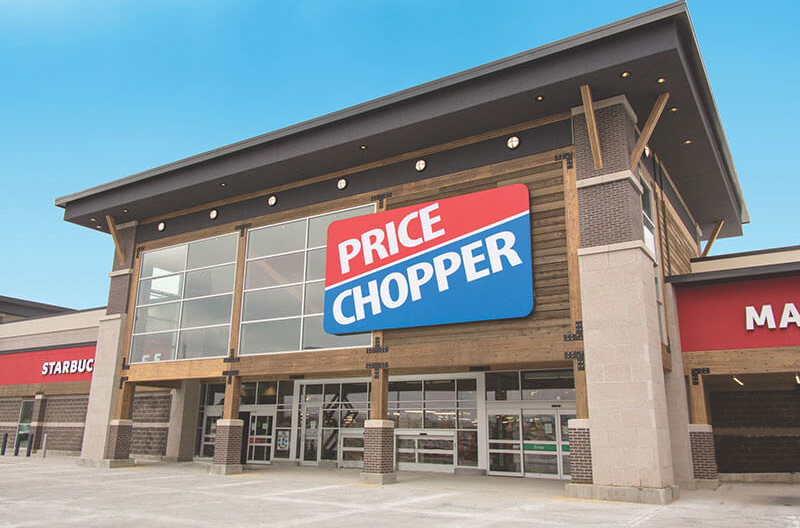by John McCurry/contributing writer
The ringing cash registers at Price Chopper’s 51 stores in the greater Kansas City region tell the tale of strong business. However, in the early weeks of the coronavirus era, there is much more to tell than increased sales.

“If you look at so many changes happening in the country, the stores look different, and there are differences in the way we are doing things and in the ways we are trying to manage things and get through the crisis,” said Brian Haaraoja, president and CEO of Price Chopper Enterprises.
Although Price Chopper’s business is way up, the actual number of transactions is considerably down as shoppers consolidate trips and stock up on items.
“Normally when our business goes up, the customer count goes up,” Haaraoja said. “Traditionally there is a lot of cross-shopping, where customers go to more than one store, which is not currently happening. I think the longer this goes on, with consumers changing their habits, there will be continued and increasing consolidation of shopping trips and less cross-shopping. They don’t want to risk going to multiple places. They are more focused on getting it done.”
Safety steps
Price Chopper has taken significant steps to prioritize the safety of employees and customers. This includes installation of plexiglass sneeze shields at checkout stands and allowing employees to wear masks and gloves, which the company provides. Customers increasingly are donning masks to shop. Haaraoja expects that to continue.
“Our customers understand social distancing because it’s going on everywhere. Nobody gets too close to anyone in the store. We’ve got markers in the store, six feet apart on the floor, so when you are in line at the register, you move up to the next marker.”
The chain has operated a couple of 24-hour stores, but most were open 6 a.m.-midnight. All have condensed their hours. The first hour of each day is dedicated to senior citizens and others who are most at risk. Stores close earlier now because there is more restocking and cleaning to do.
Getting creative in the supply chains
Price Chopper’s supply chain also is evolving.
“The customers may not notice, but we are procuring products from different suppliers,” Haaraoja said. “Our suppliers are stretched just like we are, so we have gone out to find other sources, using unconventional suppliers that we don’t normally use. The foodservice world is doing less business because most restaurants are only doing carryout and delivery, so we have tapped into some of that business, using some of those food suppliers to procure some of those products to supplement.”
While some flavors and varieties of food might still be hard to find, nearly every category has rebounded. Paper products and cleaning products have been slow to catch up, but Haaraoja said representations of each are available. Toilet paper arrives daily, but not always enough to keep shelves stocked for the entire day. As shelter-in-place orders continue and hair salons remain closed, there has been a surge in demand for hair care products.
The online boom
Online ordering is booming, too. Price Chopper partners with Instacart, whose business has “exploded,” Haaraoja said.
Instacart has amped up its hiring, but there are still longer windows for online orders.
“Every week, we see thousands of new customers that are using the online business,” he said. “I really believe that a lot of that is going to stay after this whole virus clears up. I think people are going to continue to use the online option.”
Current conditions require grocers to be nimble, and Price Chopper is constantly adapting to fluid situations and new challenges. Haaraoja and his team are looking for new opportunities or emerging trends to serve customers and keep everyone safe. This includes ramping up hiring. With employees concerned about safety, callouts have been high. Coupled with increased business, this has increased employment opportunities.
“Being able to get our online service ramped up to support customers that way has been timely,” Haaraoja said. “We are looking at every new trend we can to see if we can be of greater service to our customers. Some of the bonuses that we have made available to associates have had timelines on them, and we have extended those, and we will continue to do that. It’s a fluid situation.”
Awaiting the new normal
Price Chopper store owners meet weekly to discuss issues and trends and how they can make improvements. Haaraoja said everyone is waiting to find out what the new normal will be.
A locally owned chain, Price Chopper comprises four owners operating different numbers of stores under the Price Chopper banner. Haaraoja said part of what makes the company successful is that each owner promotes strong cultures. However, there is not blanket approach to the operation of all 51 stores.
“Sometimes it’s hard to do one thing the same in all the stores,” Haaraoja said. “But they are all offering incentives to team members during this crisis. It’s not a one-size-fits-all for the different cultures that have been developed. Each ownership group has worked out different plans for their teammates.”
Price Chopper has increased its aid to Harvesters, a large food bank in the Kansas City area, making a group donation of $250,000, which equals 750,000 meals. Harvester is struggling, Haaraoja said, because they depend on food manufacturers to supply them and with demand from retail grocery stores rising, that supply has slowed.
Haaraoja said employees are taking great pride in their work, which has taken on a new importance during these trying times. Customers are appreciative.
“With every crisis that happens in our country, Americans rally and you will see the good come out in people,” he said. “I’ve seen it in the stores, and it is amazing to me how many people thank our associates for doing what they do, to help people be able to feed their families. Our customers are grateful and supportive. They seem to understand the risks the grocery associates are taking to provide the service.”

